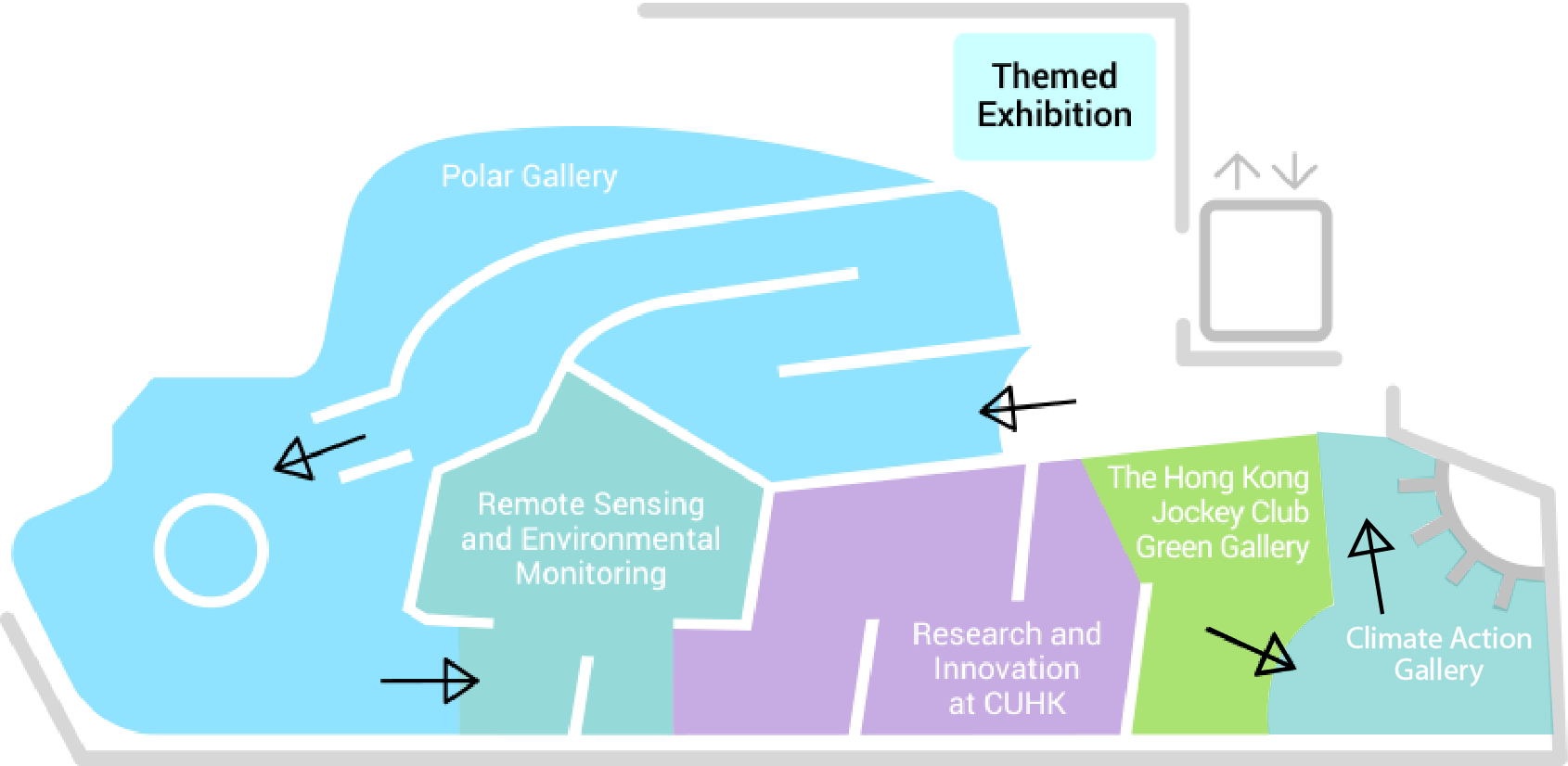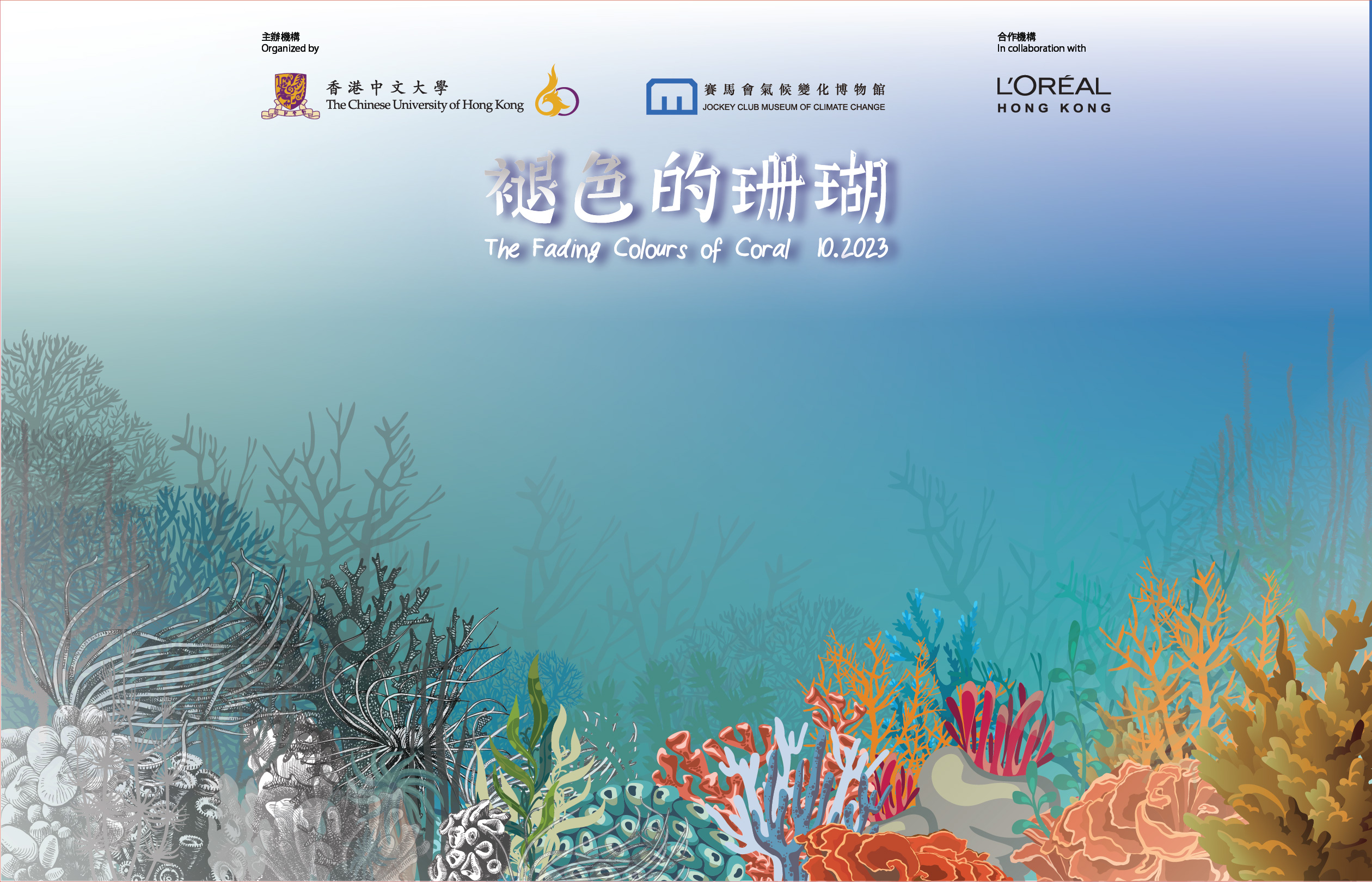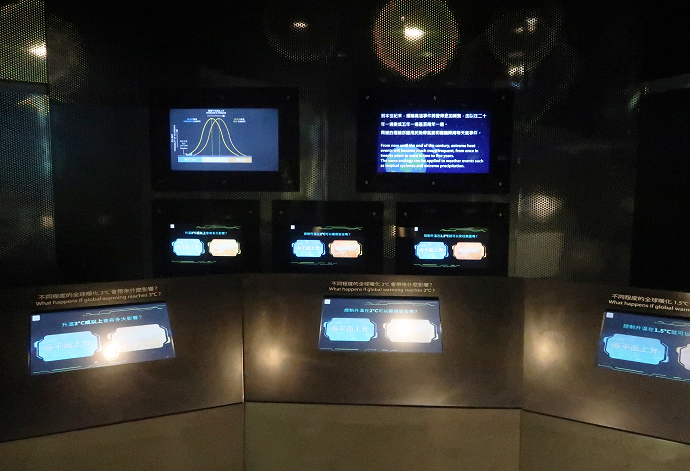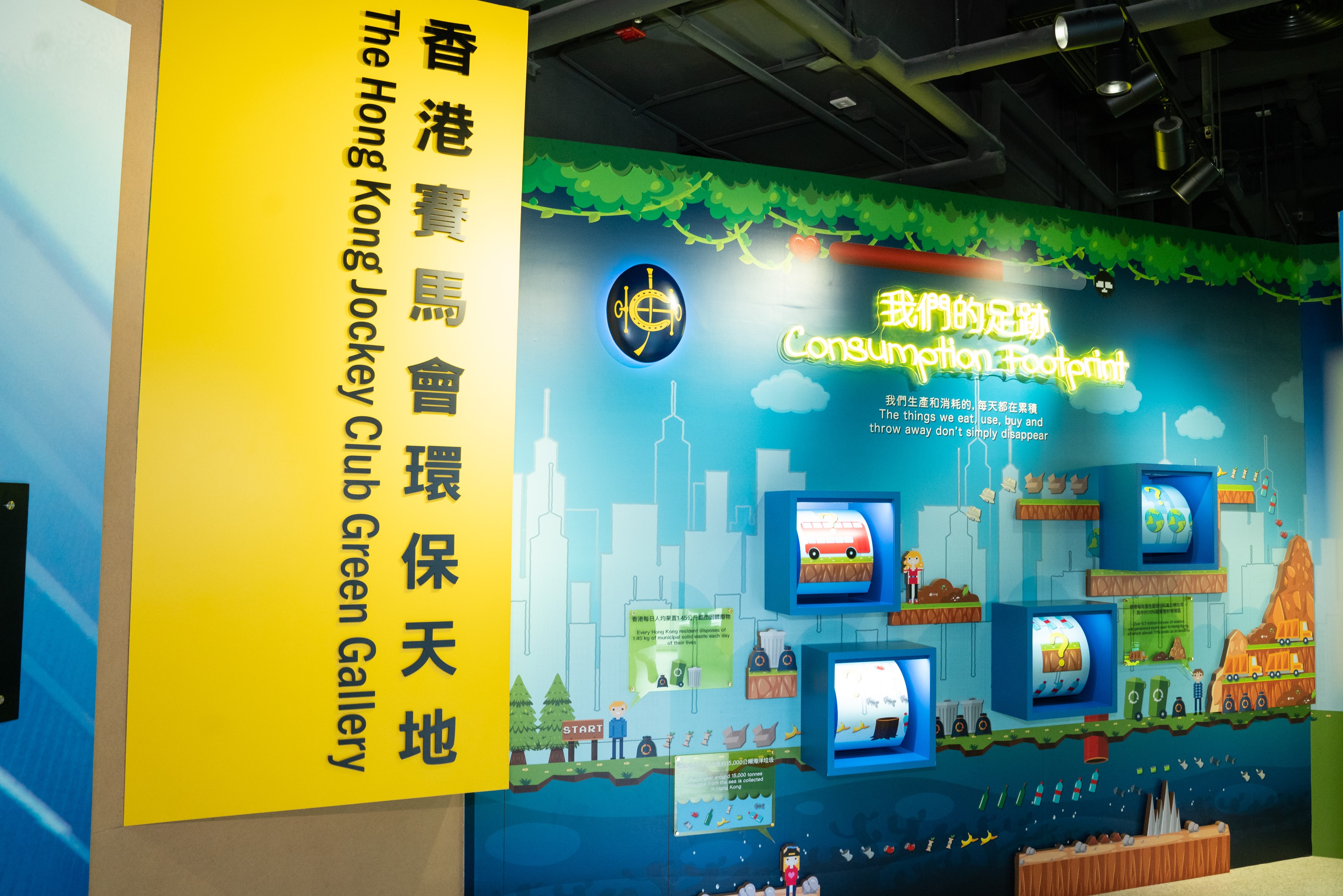MUSEUM MAP


The CUHK Jockey Club Museum of Climate Change (MoCC) will launch the Mobile Exhibition “The Fading Colours of Coral” in October 2023, to showcase potential threats of climate change on marine ecology, with the aim of inspiring students to adopt new thinking and take practical action to address climate change.
Programme Details (Chinese version only)
![]()
The exhibits in this section are based on the valuable collection from Dr Rebecca Lee, the renowned environmentalist and explorer, built through her lifelong fieldwork in the "Three Poles" (the North Pole, the South Pole and Mount Everest) and network with research institutes in mainland China. This collection offers a vivid demonstration to visitors on global warming and climate change, as well as the macroscopic impacts.

Remote Sensing and Environmental Monitoring is a collection of interactive multimedia presentation of the many types of environmental and climate information derived from Earth-orbiting satellites and other advanced technology. The visitors will be able to explore by themselves, through the application of geo-information science, how the Earth is changing in time and space and how climate change may impact the environment and their daily lives.

![]()
Research and Innovation at CUHK showcases the Chinese University’s innovative research results across a wide spectrum of environmental science and energy technology. Visitors are informed of not only the latest research developments and technological advances, but also the future potentials in these fields to combat climate change.

Environmental efforts require the community’s support. The Hong Kong Jockey Club Charities Trust has for years supported a significant number of projects to promote environmental protection in Hong Kong. This section presents major initiatives of the Club that have helped pioneer new thinking on how to protect the environment in the local community. With the aid of multimedia interactive exhibits, the exhibition promotes United Nations’ Sustainable Development Goal (SDG) 12 – Responsible Consumption and Production – and aims to inspire the visitors to get involved in waste-reduction action and to live a green lifestyle.
The Jockey Club Museum of Climate Change of The Chinese University of Hong Kong (hereafter "the MoCC") built the MoCC Mobile App app as a Free app. This SERVICE is provided by the MoCC at no cost and is intended for use as is.
This page is used to inform visitors regarding our policies with the collection, use, and disclosure of Personal Information if anyone decided to use our Service.
If you choose to use our Service, then you agree to the collection and use of information in relation to this policy. The Personal Information that we collect is used for providing and improving the Service. We will not use or share your information with anyone except as described in this Privacy Policy.
The terms used in this Privacy Policy have the same meanings as in our Terms and Conditions, which is accessible at Jockey Club Museum of Climate Change Mobile App unless otherwise defined in this Privacy Policy.
Information Collection and Use
For a better experience, while using our Service, we may require you to provide us with certain personally identifiable information, including but not limited to Email Address, your Domain Name Server address and the pages you have visited. The information that we request will be retained by us and used as described in this privacy policy. For the University's policy on personal data, please click here.
The app does use third party services that may collect information used to identify you.
Link to privacy policy of third party service providers used by the app
Log Data
We want to inform you that whenever you use our Service, in a case of an error in the app we collect data and information (through third party products) on your phone called Log Data. This Log Data may include information such as your device Internet Protocol (“IP”) address, device name, operating system version, the configuration of the app when utilizing our Service, the time and date of your use of the Service, and other statistics.
Cookies
Cookies are files with a small amount of data that are commonly used as anonymous unique identifiers. These are sent to your browser from the websites that you visit and are stored on your device's internal memory.
This Service does not use these “cookies” explicitly. However, the app may use third party code and libraries that use “cookies” to collect information and improve their services. You have the option to either accept or refuse these cookies and know when a cookie is being sent to your device. If you choose to refuse our cookies, you may not be able to use some portions of this Service.
Service Providers
We may employ third-party companies and individuals due to the following reasons:
We want to inform users of this Service that these third parties have access to your Personal Information. The reason is to perform the tasks assigned to them on our behalf. However, they are obligated not to disclose or use the information for any other purpose.
Security
We value your trust in providing us your Personal Information, thus we are striving to use commercially acceptable means of protecting it. But remember that no method of transmission over the internet, or method of electronic storage is 100% secure and reliable, and we cannot guarantee its absolute security.
Links to Other Sites
This Service may contain links to other sites. If you click on a third-party link, you will be directed to that site. Note that these external sites are not operated by us. Therefore, we strongly advise you to review the Privacy Policy of these websites. We have no control over and assume no responsibility for the content, privacy policies, or practices of any third-party sites or services.
Changes to This Privacy Policy
We may update our Privacy Policy from time to time. Thus, you are advised to review this page periodically for any changes. We will notify you of any changes by posting the new Privacy Policy on this page. These changes are effective immediately after they are posted on this page.
Contact Us
If you have any questions or suggestions about our Privacy Policy, do not hesitate to contact us at mocc@cuhk.edu.hk.
When you use this mobile application, we will have record of your Domain Name Server address and the contents you have browsed. This information may be used by us for statistical purpose only.
Policy on Personal Data
For the University's policy on personal data, please visit http://www.cuhk.edu.hk/policy/pdo/en/
收集個人資料聲明
我們會記錄使用本手機應用程式者的域名伺服器地址和曾瀏覽的內容,此等資料僅供統計之用。
個人資料政策
有關本校處理個人資料的政策,請瀏覽http://www.cuhk.edu.hk/policy/pdo/b5/
![]()
Over the past 50 years, the Antarctic Peninsula has experienced an increase in air temperature of 3°C. Its west coast is one of the most rapidly warming regions of the planet. This warming is not restricted to the Antarctic landmass but also affects the Southern Ocean.
Climate change has had little immediate effect on the potential for exploiting the Antarctic’s mineral and hydrocarbon resources, unlike in the Arctic region, but it does pose a threat to the region’s wildlife and ecosystem, and therefore may alter the Antarctic geopolitical outlook in the long run.
Ice shelves are floating sheets of ice that extend from continental ice sheets. They produce a significant amount of melted icewater in the summer, and before long begin to collapse. Scientists call this the ‘limit of viability’.
An intensified global warming causes ice shelves that used to be stable to collapse at a faster rate. As these ice blocks are already resting in the ocean, a partial collapse will not affect sea levels, but may considerably speed up the flow-rate of the glaciers behind them. These glaciers, which by definition are fresh water resources, will cause sea levels to rise once they melt. Indeed, Antarctica has lost some 2,700 billion tonnes of ice between 1992 and 2017. This is enough water to raise the global sea level by 7.6 mm on its own.
Krill feed on algae underneath the sea ice. Lower sea ice coverage will significantly reduce the krill populations.
Studies have shown that krill populations have already shrunk by 80% since the 1970s.
As krill is the key prey of Antarctic food web, its decline could have a catastrophic impact on all species, including whales, seals and penguins, that depend on krill as a major dietary item.
The Antarctic is home to some 20 million breeding pairs of penguins. There is no uniform pattern of growth or decline for these penguins. Some species are declining, while others are not.
Changes to sea ice cover in the Antarctic appear to have been largely responsible for the recent decline in the numbers of Adélies, emperors and chinstraps. Changing sea ice conditions threaten the livelihood of penguins by diminishing the number of nesting sites available to them and reducing their food supply, especially the supply of their staple food krill.
Emperor penguins are thought to be one the most vulnerable of all Antarctic species to climate change. They rely on the sea ice around Antarctica for breeding, feeding and moulting. Their behaviour and ecology are being altered by the shifting patterns of sea ice. Studies have shown that the population of emperor penguins has declined by as much as 50% in places. A recent study further suggests that the population of emperor penguins may fall by a catastrophic 99% by 2100.
Antarctica has a unique biodiversity as a result of its isolation from the rest of the world. Stronger winds and storms resulted from global warming will probably push rafting marine and terrestrial life across the Southern Ocean into Antarctica, allowing the invasion of diverse new species which would drastically alter the terrestrial ecosystem dynamics.
For further interests, more information is available from The Antarctic of our sustainability hub.
#Sea Level Rise #Land Ice Loss #Antarctic Marine Life #Climate Change
A well-curated resources hub packed with information on environmental protection, climate change and sustainable development, and designed to inspire the public to take action to combat climate change.
